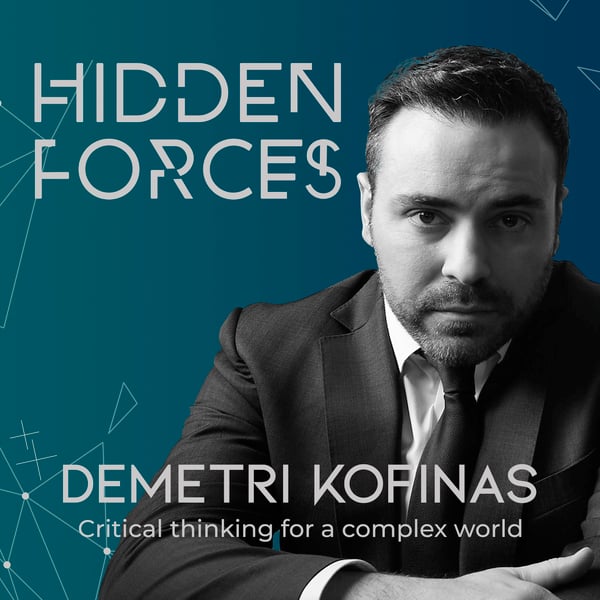The New Era of Great Power Competition | John Mearsheimer & Stephen Walt
Hidden Forces
Demetri Kofinas
4.8 • 1.6K Ratings
🗓️ 11 May 2022
⏱️ 68 minutes
🧾️ Download transcript
Summary
In Episode 248 of Hidden Forces, Demetri Kofinas speaks with professors of international relations John Mearsheimer and Stephen Walt. Professor Mearsheimer is the R. Wendell Harrison Distinguished Service Professor of Political Science at the University of Chicago and the author of multiple books including “The Tragedy of Great Power Politics,” “Why Leaders Lie,” and “The Great Delusion: Liberal Dreams and International Realities.” Professor Walt is the Robert and Renee Belfer Professor of International Affairs at Harvard University's John F. Kennedy School of Government. He is also the author of several books including “Revolution and War,” “Taming American Power: The Global Response to U.S. Primacy,” and most recently “The Hell of Good Intentions.” They both have appeared separately on the podcast before: professor Walt for a conversation on the decline of US primacy and professor Mearsheimer on the power of nationalism in international affairs.
They are also both prominent members of the so-called “realist school” and their views have often run counter to the prevailing orthodoxy in Washington, which one could broadly characterize as interventionist. John Mearsheimer especially has gained attention for his views on Ukraine, which went viral after the recent Russian invasion. Just one of his videos on YouTube alone has been seen over 26 million times. Demetri asks him about that experience, why he thinks his views have resonated so strongly with the public, and if there’s a connection between peoples’ views on Ukraine and their positions on the larger culture wars that seem to be dividing so many of us in Western societies today.
Of course, the conversation veers well beyond Ukraine, which is just the touching off point for a much larger discussion about the future of great power competition, the endurance of the alliance between Russia and China, America’s pivot to Asia, and how Russia’s invasion of Ukraine could actually make that easier, and what should the goals of American foreign policy be.
You can access the full episode, transcript, and intelligence report to this conversation by going directly to the episode page at HiddenForces.io and clicking on "premium extras." All subscribers gain access to our premium feed, which can be easily added to your favorite podcast application.
If you enjoyed listening to today’s episode of Hidden Forces you can help support the show by doing the following:
Subscribe on Apple Podcasts | YouTube | Spotify | Stitcher | SoundCloud | CastBox | RSS Feed
Write us a review on Apple Podcasts & Spotify
Subscribe to our mailing list at https://hiddenforces.io/newsletter/
Producer & Host: Demetri Kofinas
Editor & Engineer: Stylianos Nicolaou
Subscribe & Support the Podcast at https://hiddenforces.io
Join the conversation on Facebook, Instagram, and Twitter at @hiddenforcespod
Follow Demetri on Twitter at @Kofinas
Episode Recorded on 05/10/2022
Transcript
Click on a timestamp to play from that location
| 0:00.0 | What's up everybody? My name is Demetri Gafinas and you're listening to Hidden Forces, |
| 0:06.0 | a podcast that inspires investors, entrepreneurs and everyday citizens to challenge consensus |
| 0:12.9 | narratives and to learn how to think critically about the systems of power shaping our world. |
| 0:18.0 | Today's episode was released early, the premium subscribers last month, and it features two |
| 0:23.0 | guests who have both been on the podcast before, John Mirschheimer and Stephen Walt, whose previous |
| 0:28.5 | appearances I've linked to in the related section of today's episode page on our website. |
| 0:33.5 | They truly need no introduction, at least not for anyone remotely familiar with the field of |
| 0:39.1 | international relations. They're both prominent members of the so-called realist school and their |
| 0:44.0 | views have often run counter to the prevailing orthodoxy in Washington, which I would broadly |
| 0:49.4 | characterize as being proudly interventionist. Professor Mirschheimer, especially, has generated |
| 0:56.4 | a lot of attention for his views on Ukraine, which went viral after the invasion earlier |
| 1:01.5 | this year. Just one of his videos on YouTube alone, which I've linked to in the summary |
| 1:05.9 | notes, has been seen over 26 million times. And one of the things that I asked him about |
| 1:11.1 | today is not just what that experience has been like, but why he thinks his views have resonated |
| 1:16.3 | so strongly with the public. And if there's a connection between people's views on Ukraine |
| 1:21.9 | and their positions on the larger culture wars that seem to be dividing so many of us in |
| 1:27.3 | Western society today. The conversation veers far beyond Ukraine. Ukraine is just a touching |
| 1:32.1 | off point for a much larger discussion about the future of great power competition, the |
| 1:37.2 | endurance of the alliance between Russia and China, America's pivot to Asia, and how Russia's |
| 1:42.5 | invasion of Ukraine could actually make that easier. And just generally speaking, what should |
| 1:47.0 | the goals of American foreign policy be? What do we want to achieve with our military and diplomatic |
| 1:53.4 | influence in the world? As most of you already know, hidden forces is listener supported. I don't |
... |
Please login to see the full transcript.
Disclaimer: The podcast and artwork embedded on this page are from Demetri Kofinas, and are the property of its owner and not affiliated with or endorsed by Tapesearch.
Generated transcripts are the property of Demetri Kofinas and are distributed freely under the Fair Use doctrine. Transcripts generated by Tapesearch are not guaranteed to be accurate.
Copyright © Tapesearch 2025.

